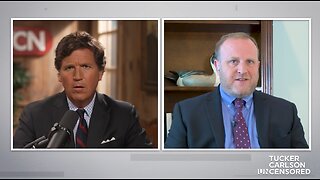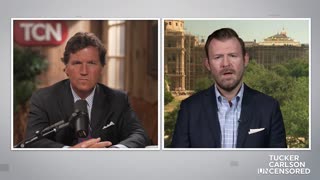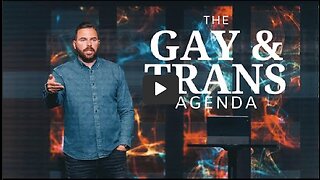Tucker Carlson Uncensored: A Post-Christian America w author John Daniel Davidson
Pagan America The Decline of Christianity and the Dark Age to Come is John Daniel Davidson new book.
The defining features of a pagan society are slavery and human sacrifice, so it shouldn’t surprise us to see their resurgence in a post-Christian America.
link to original here >>> https://tuckercarlson.com/uncensored-john-daniel-davidson/
READ THE TRANSCRIPT
Tucker [00:00:00] One thing we know about human civilizations is they're inherently religious, even, or maybe especially the ones that claim to be secular. Everybody worships something. So as the United States becomes progressively a now aggressively less Christian, that doesn't mean that religion has disappeared. Easter was replaced just the other day by the Biden administration with the worship of transexual ism Trans Visibility Day. So it's a religion. It's just different. And in this case, it happens to be a pagan religion. And that's the direction the United States is speeding right now toward paganism. The question is, what does that mean? And does it make anybody happier? Very few people have thought about this in any systematic detail. John Daniel Davidson of The Federalist is one who has, in fact, he's written a new book on it called Pagan America The Decline of Christianity and the Dark Age to Come, and we are happy to have him join us now. John, thanks very much for coming on. So pagan America does a bunch of questions, but does the decline of Christianity, which is demonstrable and obvious and intentional? Does that inevitably mean paganism?
John Daniel Davidson [00:01:08] In a word, yes. Because in the end, there is only one alternative to Christianity, and that is paganism. And and we should be clear about our terms. Right? When we say paganism, I don't mean that where there's going to be a sudden resurgence of worship of Zeus or Odin. You know, and, an explosion of witchcraft, although that is happening as well. Yes. What I mean is a return of the pagan ethos and the pagan ethos, is and always has been a rejection of transcendent or objective truth. Right. Pagans were free to devise and assign divine status to the here and now, to things, to natural phenomena, even to people. And we are returning to that as the world becomes re enchanted from its, sort of secular hiatus that we that we've been on for the past century or so. And what that means in America, of course, is a radical moral subjectivity that we see in the trans movement that we see in Black Lives Matter and critical race theory that we see all across our society asserting itself now that rejects the what are fundamentally Christian claims about the human person, our relationship to one another, and our relationship to God.
Tucker [00:02:25] So it seems like one of the ways, maybe the main way that Christianity is different from all other religions in a practical sense, is that it rejects human sacrifice, human sacrifice being a constant throughout all recorded history in every non-Christian culture, human sacrifices at the center. So as Christianity recedes, should it surprise us that abortion, euthanasia, killing, war, human sacrifice has come to the center of our culture?
John Daniel Davidson [00:02:53] Not at all. In fact, I deal with this at length, specifically with abortion and euthanasia as the most obvious manifestations of the return of human sacrifice in the new pagan cults. And it's interesting when you look at the justification for something like abortion, you know, back after Roe v Wade and even into the 1980s, the justification was, this isn't a human being. This is just a clump of cells. You're not taking a human life, and, these fetuses aren't viable. And as medical technology progressed in the 80s and 90s and over the past 25 years, you see the justification change. Advances in medical technology made the original justification, make no sense. It could not be maintained that this was just a clump of cells. We all knew, and we all know undoubtedly now, beyond any doubt, objectively, an unborn human being is a human being. Right. And and so the justification has changed from it's a clump of cells to safe, legal and rare to shout your abortion. And so now you have a positive defense of abortion as a, as a good, in fact, as a moral good that we should brag about and we should champion. And that is not a Christian value. That is a pagan value. And it's reasserting itself now in a modern context.
Tucker [00:04:17] Well, I have noticed this. I haven't thought it through to the impressive degree that you have, but I notice that the justification for abortion went from essentially rational rates of if the fetus is not a human being, that's no different from an appendectomy, and I don't agree with that, but that is a rational defense of abortion. It's not a big deal because the question of taking life doesn't enter into it. But once you give that up, then what exactly is what is the justification? Is there justification publicly declared justification for taking another human life?
John Daniel Davidson [00:04:48] Well, there is now, and it's very pagan indeed. The justification now is that is the will of the mother that determines the humanity of the child. So we have abortion laws in this country where a child of the same gestation, two children of the same gestational age in two different states, one, has to be saved if born prematurely. All the medical technology, all the medical expertise that can be brought to bear to save that child's life, must be brought to bear. Same gestational age child born in another state can be killed with impunity. The only thing that determines the humanity of this person is the desire of the mother to have the child or not have the child. And that is also quintessentially pagan. Because in a pagan society, what determines. Right, what is morally correct is based on the is based on a power dynamic. Those who have power do what they want to those who have no power. And that is their right. That is their their their God given right to enslave or kill or rape or abuse anyone who they have power over. And that's the dynamic we see returning now. It may start with a rational or secular justification, as we saw with abortion, but as we're seeing now in places like Canada with euthanasia, it quickly moves. Into a power dynamic where people who are inconvenient are simply being killed. And there's very little justification on a moral, on a Christian moral basis for it. Instead, there's there's a pagan moral justification, which is all about power and force and will.
Tucker [00:06:20] And there's a delight there. I mean, you watch the Treasury Secretary, Janet Yellen, who I consider a criminal based on crimes, is she is committed and never been punished for. But whatever you think of Janet Yellen, her job has nothing to do with abortion. She's the Treasury secretary and she comes out sort of in. It's almost like this non-sequiturs like, why are you talking about abortion? And tells us that it's just a good thing. It's just a good thing. And if you want to help this country, you'll have more abortions. And she's thrilled to do it. So I look at that and I'm like, there's a supernatural component here. There's got to be because there's no rational justification for it.
John Daniel Davidson [00:06:52] Yeah, exactly. There's no rational justification to allow healthy young people who are suffering from depression, or maybe substance abuse, addiction to, to kill themselves, but to have physician assisted suicide rate. And yet that's what's happening in Canada right now. And they went down the slippery slope. It only took them a few years to go from only people with terminal illnesses to, anyone who's depressed and lonely, and maybe, maybe also people who are costing the national health system a lot of money. Maybe those people do. We can get rid of them. And there's actually, you know, some government studies in Canada have actually calculated how much the National Health Service will save by expanding their euthanasia program. This is really dark stuff, and we have to understand it for what it is. It's the replacing of Christian morality with pagan morality and the transformation of, of a republic of self-governing citizens into what essentially is a slave empire, where those with power, the ruling class, rules over an underclass that is subject to, to to that power. And that's a very different dynamic. It means a total transformation of American society. And I don't think that many people have really started to wrap their heads around the implications of that for all of us.
Tucker [00:08:08] Well, in in Canada, I mean, you have the state murdering its own native population, overwhelmingly the Christian population of Canada, people whose ancestors were Christian churchgoers and then replacing them with people, you know, who are not Christians from other countries. So it's it's hard not to see that as as part of it. I mean, that's just a fact. I mean, I guess you could interpret it in a different way, but it's it's the Christian Canadians who are getting killed by the state. I think that's just as true.
John Daniel Davidson [00:08:34] I mean, it's also, you know, we saw with this, this hoax about the mass graves at the indigenous schools as well, that unleashed, a flurry of violence against Catholic churches in Canada. Dozens of churches were burned down, vandalized, destroyed. And the prime minister, encouraged it. He cheered it on. Yeah, it was the same thing with the Black Lives Matter protesters here in the summer of 2020. The regime did nothing. They encouraged it. They they wanted it to happen. They were willing to countenance violence in the streets. And the use, again, the use of raw force to advance their agenda and cement their rule, and then and then unequally apply the force of the state against Christians, against, pro-life protesters, against people who were in the vicinity of the Capitol on January 6th. This is a pattern that we're going to see repeated more and more often as we get away from this idea, of traditional Christian morality, that is to say, individual rights, rule of law, consent of the governed. These aren't things that just exist in like a secular liberal utopia. They depend on an actual Christian society to sustain them. And when Christianity, you know, declines or becomes we enter into a post-Christian era, those things are going to go away. Like they can't they can't sustain themselves on their own. And I don't think that that we appreciate just how much we rely on our Christian inheritance for, like, our specifically American way of life.
Tucker [00:10:07] So I think that's really insightful what you just said, but it's also the opposite of what we were promised. So what we were promised, as always, was liberation from the strictures of this ancient religion that kept people from dancing and playing cards and having premarital sex and like any kind of fun at all. Right. It was to fit the Footloose model and but that's not. But what we got was not liberation. The country doesn't seem fair or liberated as compared to the America of 30 years ago. So it does seem like it's a lie.
John Daniel Davidson [00:10:37] Yeah, yeah. Well, it is a lot. And I think there's, there's a, there's a misunderstanding maybe of terms that, that has crept into our society as well. Like when the founders said life, liberty and the pursuit of happiness, they understood happiness in a very specific way, which was the cultivation and the acquisition of virtue. Right, right. You are free to not to do as you as you want to, whatever you want to. You're free to do as you ought. You know, this is something, you know, John Paul the second talked about that, that the true meaning of freedom was freeing you to be good, right? And to be virtuous. It wasn't freeing you to, you know, try to change your, your sex and, or to to engage publicly in, in sexual fetishes and to try to foist that on children, or to be, you know, not not racist. That's not what freedom is for. And so we see, along with the decay of freedom into into license, right? We also see a disfigurement of reason. And that's also characteristic of pagan societies. Reason and faith are complementary. That's what Christians have always believed because it's the truth. But now we see creeping in, an abuse of reason. And you see this most obviously, right, in the Covid pandemic where people were invoking science but making everyone do these completely irrational things that had nothing to do with science, and were totally unreasonable. And you see this justification everywhere now in public life and always it is the we still use the language of science and reason. But clearly what is what is what is the determining factor for the people in power is simply force and will. We are going to make you do this not because it's reasonable, not because it even works. We're just going to make you do it because we're telling you to do it, and we're going to start to see a lot more of that to Covid. Should have been a real eye opener. And I think it was for some people about what the regime is capable of and how we're sort of operating on a new level, even when it comes to the justifications for major public policy.
Tucker [00:12:42] So, I mean, I think this I think you're exactly right. You know, Christianity has rules, but by its nature, it rarely uses force to impose them on others. Paganism is the opposite. So the first several centuries after Jesus's death, the Romans were in charge. It was a pagan society, and they required all subjects to bow down before their gods to acknowledge their gods. Christians wouldn't, and they murdered the Christians by the tens of thousands. Then Constantine converts. It becomes a Christian empire. But the Christian empire does not force the non-Christians to bang on before Jesus on pain of death. It allows them to live there. Right? So they're like, in other words, Christianity is more, I guess, in the American sense, a little bit more libertarian or much more libertarian really, than any kind of pagan religious structure. Or am I misreading this?
John Daniel Davidson [00:13:31] No, you're absolutely right. Tolerance, like religious tolerance, is a specifically Christian principle. It exists only in Christian societies, and it depends on a Christian worldview. And you have to accept some Christian theological claims about about the cosmos and about man and God in order to even entertain the idea of something like tolerance or freedom of speech. Right. These are luxury goods that only a Christian society can afford, right? Right. Because because Christianity, it does not compel belief, but pagan societies do. And so the idea that we could have, like tolerance and we could have freedom of speech and we could have sort of a live and let live libertarian is exactly without Christianity is totally false. You actually need a Christian society and a, an, a public square that is shaped and formed by Christian moral virtues in order to have tolerance, in order to have freedom of religion and freedom of speech. So, you know, when the founders, when George Washington sent his letter to the Hebrew congregation, you know, what he was saying in part was we will not impose force on you. We will leave you free to practice your faith because we are a Christian nation. And because we can allow that, we can we can have tolerance for your for your beliefs here because we are Christian, we're losing that. And when we lose that, we are going to see force and compulsion and coercion come back into the public square with with force. And we're actually seeing that right now. I mean, how much longer are people going to be allowed to be pro-life or to oppose gay marriage, or even to, you know, insist that that men are men and women are women.
Tucker [00:15:12] All right. Bow down before my tranny God. I mean, that's that's what they're demanding. It's feels like people got this backwards. And I just want to press you a little bit on the on the question of science. So science flourished in the West, and really only in the West. Pure science flourished only in the West when it was Christian. And as Christianity recedes and of course, under attack and disintegrating in, in its institutional form, science is going away too. I notice that our leaders don't believe in actual science. In empiricism, for example, what's the connection between Christianity and science?
John Daniel Davidson [00:15:49] Well, so what we were saying earlier about, you know, that there is no conflict between faith and reason. These are these are complementary truth about the physical world is is revealed by God, but it's also revealed to mankind through our reason. Through the faculties that God gave us. We are created in the image and likeness of God, and we can apprehend truth about God's creation through our senses and through our rational minds, and using the scientific method using scientific instruments. It doesn't mean that the only thing that's true are things that we can measure with our instruments, right? But the things that we can measure with our instruments are true. They are part of God's truth. But when you reject the idea of God's truth, or the existence of God, or even the existence of a of a rational and reasonable, universe, what you're left with again is there's just force and will. And so there's a we see now, a comfortableness on the part of our ruling elite to simply ignore science, to suppress it, to censor it whenever it contradicts their agenda, especially when it comes to things like the transgender movement, where all of the science and all of the studies that we have point to how harmful and how dangerous it is, and how the people who are suffering essentially from gender dysphoria need help. And all of that is being ignored in favor of this radical pagan agenda. It's also is being ignored about social media and screens. We know that those things are harmful. We push them on kids anyway. So we're going to see this a lot more often to a disregard for science. And so like appeals to scientific studies and appeals to reason and to objectively, observable phenomena are going to start to fall on deaf ears because, because a pagan regime, really doesn't care about objective truth and doesn't care about moral objective truth, but also doesn't care about scientific objective truth.
Tucker [00:17:48] Yes. It's just so interesting. And I mean, that's a refrain in my own head every day. Everyone's so unreasonable. When did people get so unreasonable? Truly unreasonable. They just don't care what the established facts are. But I haven't connected it as directly. And as eloquently as you just have to. Religious faith is. It's just interesting that everything the reality is exactly the opposite of what we've been promised for the last 40 years, which is a secular society will be more tolerant and more reasonable. Religion. Christianity specifically, is the root of division, the root of oppression, and the root of superstition. Right? It's the opium of the masses. But that the opposite has turned out to be true. Am I reading this?
John Daniel Davidson [00:18:29] No. You're right, the opposite is true. I think, you know, we have to take a step back and understand, like the idea of secularism, of a of a neutral public space where where everyone was free to kind of have their own opinions and go their own way. That is a temporary that was kind of this temporary, like caesura in the life of Western civilization made possible by the triumph of Christianity, but reliant on on Christianity for its sustenance, for its vitality. The the thing that we're seeing now is a return to form, right? You either have a Christian society and a public square that allows for, you know, secularism and freedom of speech, I mean, secularism. The whole idea of secularism was was invented by Christianity. So it's a product of Christian civilization. But without that, as Christianity recedes, we're going to return to a different form of society. And that's what I mean when I say there's only two options here. There's there's the Christian society and there's a pagan society, and it's we're going to go under different names where it's not going to take the same forms as it did in ancient times, but the ethos and the the cosmological worldview of the ancient pagan world is going to be reconstituted in modern times, and it's going to be very bad. It's going to be the kind of society that not even a secular atheist will want to live in. I don't know if you saw the other day the famous atheist Richard Dawkins, in an interview was saying how he's a cultural Christian, he's not a believing Christian, and he's upset that there's so much being made in Britain about Ramadan because he thinks Britain should be culturally Christian, and he likes cathedrals and he likes the old Christmas carols. And why can't we? Why can't we just have that? Well, you can't have that, Richard, if you don't have actual believing Christians who are practicing the faith, there has to be somebody in the cathedrals that are that is worshiping somebody who's singing the Christmas carols, who believes the content of the words. Without that, cultural Christianity withers and dies and something else is going to come in and replace it. If you don't have actual Christians living the Christian life in the public square, in your nation and in your community.
Tucker [00:20:42] Well, I don't I'm a little confused, by the leadership of Christian churches in this country and why there's this reluctance, to say obvious things that are clearly true and in the interest of their congregations and of their faith, things that they would be required to say, really, as Christians. And I'm even more deeply. Confused by, in many cases, the collaboration between those churches and a regime that hates them. Why have so many Christian leaders just stood by and allowed Joe Biden, for example, to pose as a Christian, or people around him to pretend that this isn't really about Christian Christianity? Like, why not just tell the truth?
John Daniel Davidson [00:21:24] I yeah, I have I as a as a Roman Catholic myself, I had to say I'm dismayed and confused about why Joe Biden hasn't been excommunicated from the Catholic Church by now. Joe Biden and Nancy Pelosi and many other major political leaders who purport to be Catholic in public. But it is very confusing and it's disheartening. I think a lot of Christian leaders in America, have given, have accepted this false notion that winsome ness and being nice is the way to win people over to the faith. And not sort of, you know, speaking clearly about about moral truth. And I think it's a great mistake because, of course, the loving thing to do to anyone, if you love someone, you tell the truth, right? You have to tell them the truth if you love them, because you don't want them to persist in a lie that that harms them and damages them. So when it comes to an issue like transgenderism, the loving thing for Christian leaders to do is not to pretend that this is normal or healthy, but it's to tell the truth about transgender ideology to save people who may be ensnared in it, from from getting involved in it, and to help people who are ensnared to get out. And a willingness to tell the truth has been sorely lacking from our religious leaders across, you know, denominations in the United States. And I think that has to change. We have to grow a spine, and our leaders have to, get some backbone and be willing to speak the truth, the Christian truth about men and women, about the unborn, about how society should be structured, about marriage, about children. And speak it clearly and unapologetically in love. But but without caveats. That's that is loving. That is the way to love people as Christ loves them. And that's also the way to win souls and to convert a nation and a people. Is is to not apologize for the truth. And unfortunately, as you say, we have had a lot of mealy mouthed, weak Christian leaders in this country that don't know what time it is and who don't realize, like what we're talking about, that our society is becoming post-Christian and in the future pagan order that's coming into being in America. You you either speak the truth or you accept the lie. And too many of our Christian leaders are tacitly right now accepting the lies of the regime.
Tucker [00:23:45] Well, given that you can only serve one master, I mean, you are only serving one master, right? So if you're a bishop or some sort of religious figure who stands next to Nancy Pelosi or Joe Biden, both of whom have, you know, aggressively promoted human sacrifice, and you don't, you know, say, get behind me, Satan. Then you're not, you know, you're you're serving dark forces or you're not. I mean, it's not just that you're polite or shy or something. It's that you're actively working, against the God you claim to serve. I would think you are.
John Daniel Davidson [00:24:21] And this gets to the other big thing about paganism. And the reason for its persistence. Right? In the ancient pagan world, it was understood that the pagan gods were real beings. They were, gods. Angels. What? What we might call today dis incarnate intelligences or multi-dimensional beings. Right? But the point is, they were cast out of heaven. So they're here. They're here. And worshiping them and swearing fealty to them and giving sacrifice to them confer certain benefits.
Tucker [00:24:57] Let me ask you to pause for a second and just elaborate. So you're saying that in traditional pagan societies, these gods cast out of heaven, moving from the spiritual realm to the physical realm, but were occupying the physical realm like you could touch them. They were physically present. Is that what you're saying?
John Daniel Davidson [00:25:15] I'm saying, well, they were they were physically, represented in, in temples and in idols and. Yeah, you know, in, in rites, in secret rites and rituals and in pagan sacrifices, human sacrifices, and other kinds of rituals. That was that was how are we connected to these, these nonphysical beings? But it was understood that these nonphysical beings were they had authority and power over the things in the earth, over nature, in some cases over the fortunes of nations and armies and rulers. And that was a pretty universal belief in, in the pagan world. And it was even, a belief of the, of the Jewish people, although their account corrected the pagan account. So instead of, the god Bael overthrowing his god and taking the throne, the attempt to overthrow the one true God by. Lucifer was defeated and Lucifer was cast down with fallen angels and cast down to earth. Right. And so to your point about whether or not you either serve God or you serve the forces of darkness, you serve the devil. That is still true. Right. As Christians, we believe that's true. That that's that Satan is real. That fallen angels are real. And that and that the occult, is something that is also real. And, you know, I think people are becoming more and more aware of this, that paganism changes throughout the ages, and it takes different forms and we use different words to describe it. But certainly these, these forms of worshiping other beings, and other gods besides the Christian god are visible now. That they're manifest now. You can see it working itself out now, not just in like, teenagers, you know, practicing witchcraft on TikTok, although that is one manifestation of it, but also with the transhumanist movement and the transgender movement, you know, it's very pagan in the way it talks about what human beings are and what our destiny is. Even in, in the artificial intelligence, community and the push to develop AI. These AI developers talk about it. They talk openly about creating gods and creating a god that will do things for us that we can't do that's more powerful than us. It's very it's a very pagan mentality, and we need to understand where it's going. And it's not going anywhere good.
Tucker [00:27:33] And that it's real. I mean, I guess I would argue that every religion, every religion believes that spiritual beings physically walk among us. That's the heart of Christianity. God became man. He got crucified, came back, met with his disciples, ate broiled fish, and then went to have it like that. But he physically existed. And so I think every society from the beginning of recorded history has believed that, you know, beings from that dimension are right here and you can touch them. And so, like, it's real, I think. Is that fair to say?
John Daniel Davidson [00:28:09] Yeah, I think that I think that more and more people are, are coming around to that way of viewing the world. Some of them are Christian, some of them reject Christian.
Tucker [00:28:18] Right.
John Daniel Davidson [00:28:19] And and so but so they're not going to serve the Christian god, Ray. Going to serve some other being. And they're going to get more explicit about it, too. You know, I think that that and there's a whole bunch of different directions that, that this discussion would go and probably don't have time to get into all of it, but, but, but we're seeing that play out. And I try to explain some of those instances in the book, maybe that people haven't thought of, particular with artificial intelligence. I think there's some of this going on with the, the UFO, UAP phenomenon. People who are who are looking into that and who are deeply involved in that, you know, when they're pressed on it that, you know, they'll talk about how they believe that they're in touch with these discarded beings that are, they're very advanced and that have advanced knowledge. And that and that will confer that knowledge on us for a price. And this is exactly how like, the ancient Mesopotamians understood their gods as well, that that they would get knowledge, secret knowledge, and they would get advantages in technology in exchange for serving these gods. And, you know, it's difficult for modern men to where we're used to kind of a materialist vocabulary and a scientific way of looking at the world. But but that's being eroded and and, we're, we're seeing the creation now of what C.S. Lewis called the materialist magician. In The Screwtape Letters, he talks about how they want to conceal their presence. The demons want to conceal their presence from the materialist human beings. You know, because because that that way they can make skeptics and materialists out of them, but they hope someday to develop a new man who is both a materialist and a skeptic, but, also recognizes the existence of forces while not naming the spirits. And Veritably worships them while maintaining his skepticism. And that kind of man is coming into being now.
Tucker [00:30:11] Well, I I've met quite a few of them. So just to press you a little bit on that, what you said about UFO, UAP, phenomenon, which, you know, I think people are waking up to the fact, the established fact that there is something going on. It's not from China, Russia, the US government has detailed knowledge of it, which is being withheld from the public like that. All is established fact, I would say. But in in the reporting on this, the research into it that you have done, what are your conclusions? Do you think it is possible that the US government has or elements of the US government? People within the US government are in contact with these beings, spiritual beings? I think it's fair to say, and have made some arrangement with them, as the ancient Mesopotamians did, as an exchange of technology for compliance for, for worship, for something.
John Daniel Davidson [00:31:02] I think that's. The most reasonable explanation.
Tucker [00:31:05] You think that's the most reasonable? You think that's the most reasonable? That's like the most far out thing I've ever. That's ever entered my brain. Right.
John Daniel Davidson [00:31:13] Well, again. Right. So, again, you know, the reasoning from.
Tucker [00:31:19] The most reasonable explanation. I mean, I agree with you, but I just-
John Daniel Davidson [00:31:25] Think of I think, it's more reasonable than thinking that these things come from space, right? Yeah. They don't come from space. I'm aware these aren't, like, these aren't little green men who are, like, flying ships through, like, from Mars to Earth. I think that, the UAP phenomenon is, is best explained. The most reasonable explanation for it is that it is a spiritual phenomenon. And the beings that people, report having encountered, are discarded multi-dimensional intelligences or what Christians would have called demons or angels and have called throughout human history and inauguration. Peoples have had different names for them as well. You know, we I think we call them aliens, to kind of soothe ourselves, right? Because for modern man, for a materialist, skeptical modern, it's too much. It's too scary to say all of these are angels and demons. And so we say, oh, they're they're aliens. They're aliens. That's that's more reasonable. No. I, I do think that these things are real, that our government has had contact with them. Possibly other governments have to, and that they're being it's being kept secret for obvious reasons. But but I think the more you look into it that, that's really the only, reasonable explanation that you can come to. You know, it's either that or you have to descend into kind of a rat hole of conspiracy theory, in thinking that, you know, we have these secret technologies that are totally manmade. And there's the government has invented UFOs as an elaborate way to cover it up. You know, and, and even these videos that we, you know, saw in recent years from Navy pilots are all fake, you know, and it becomes a lot less reasonable to believe that then, than to believe the ancient Christian beliefs that people have believed through for thousands and thousands of years. Yes, and are attested to throughout all human history. I think that that is the most reasonable explanation. And I think, too, that as we enter into this post-Christian era and this new pagan era arises, that's going to become a lot more obvious.
Tucker [00:33:35] I couldn't, I could not agree with you more. I wonder, though, if you will just expand a little bit on the implications of that. So if the U.S. government, which we pay for and does all of this, whatever it does in our names, because it's a democracy, it's our government, if the US or parts of the US government, people within the US government employees or contractors have made contact with dark spiritual forces, which I think is true and have made some arrangement with them, with technology exchange, you know, that would require them to be complicit in whatever these forces, are doing. Like what are the implications of that? The U.S. government, our government.
John Daniel Davidson [00:34:15] Well, yeah. So the implications of that is that, yeah. America is not going to decline and fall. America is going to become evil, right? I mean, that what, you know, if if elements of the of the, deep state, right, we can call it the administrative bureaucracy or what, the permanent deep state, are doing this, then then that deep state, we need to understand that is a hostile force that is you setting about, evil designs, and is and is pursuing malign ends. And one thing that that, that deep state and those forces are not interested at all is in, allowing Christians to sort of flourish and practice their faith openly in the United States. They're not interested in that at all. And so Christians need to get get that through their head. Part of what I'm trying to do with this book, I should say, I don't go into the UAP UFO thing in the book, but it's obviously adjacent to it. And and the implications are obvious. Part of the purpose, my purpose of writing the book is to get Christians to kind of accept the reality that to wrap their brains around what's happening, it's hard to do. It's hard to accept that your government is is is an enemy, not just of, your political party, but but your whole way of life and your and your religion and your family and your community, and that you need to be prepared for your government to be an enemy and to persecute you and come after you. And you need to be prepared to be, a minority in a post-Christian society and understand what the implications of that are. I don't have all the answers. There's not a chapter in the book that says these ten steps will save America. I think the first big step is to get people to realize this is happening. This is the reality. And and to, to not kind of trundle along like, like, we live in the 1940s. We don't. That world is over.
Tucker [00:36:15] John Daniel Davidson. Really appreciate this conversation very, very much. The book is Pagan America The Decline of Christianity and the Dark Age to Come. Thank you for writing it and for telling us about it, I appreciate it.
John Daniel Davidson [00:36:26] Thanks, Tucker, I appreciate it.
-
 23:53
23:53
crashingthunder
22 days agoTucker Carlson Uncensored: Systemic Racism Against White Americans author Jeremy Carl
3621 -
 41:55
41:55
Preaching for God's Glory
10 months ago $0.12 earnedTucker Carlson understands the Bible BETTER than MOST CHRISTIANS!!! MacArthur, Washer, Baucham, Begg
869 -
 36:21
36:21
MyCatholicRedPill
7 months agoTucker Carlson HUGE 10.3.23 "America has FALLEN"
2.22K1 -
 5:19
5:19
VictorHugoArt
1 year agoTucker Carlson USA Fulfills Crackhead Jesus Prophecy Amazon Book Ban Alexander Dugin Victor Hugo PRC
131 -
 36:42
36:42
Qanon76
24 days agoUncensored: A Post-Christian America Tucker Carlson
1.2K2 -
 3:46
3:46
MyCatholicRedPill
8 months agoTucker Carlson: "In 2008 it became really clear that Barack Obama had been having sex with men
4.6K3 -
 58:25
58:25
HebrewIsraelitesHolland
1 year agoTUCKER CARLSON GOT FIRED FOR PRAISING GOD AND REJECTING SATAN (TARGETED FOR SPEAKING THE TRUTH)
4445 -
 1:21
1:21
pepperpeep
25 days agoTucker Carlson: A Post-Christian America
170 -
 1:01:09
1:01:09
Jackson Lahmeyer
11 months agoThe Gay & Trans Agenda In America | Pastor Jackson Lahmeyer
1.32K5 -
 0:54
0:54
Preaching for God's Glory
9 months agoTucker Carlson understands the Bible BETTER than MOST CHRISTIANS!!! MacArthur, Washer, Baucham, Begg
233